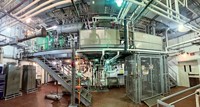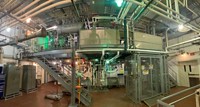Advertisement
Grab your lab coat. Let's get started
Welcome!
Welcome!
Create an account below to get 6 C&EN articles per month, receive newsletters and more - all free.
It seems this is your first time logging in online. Please enter the following information to continue.
As an ACS member you automatically get access to this site. All we need is few more details to create your reading experience.
Not you? Sign in with a different account.
Not you? Sign in with a different account.
ERROR 1
ERROR 1
ERROR 2
ERROR 2
ERROR 2
ERROR 2
ERROR 2
Password and Confirm password must match.
If you have an ACS member number, please enter it here so we can link this account to your membership. (optional)
ERROR 2
ACS values your privacy. By submitting your information, you are gaining access to C&EN and subscribing to our weekly newsletter. We use the information you provide to make your reading experience better, and we will never sell your data to third party members.
Outsourcing
Thermo Fisher will acquire a GSK plant in Ireland
The latest in a series of acquisitions adds oncology-drug active capacity
by Rick Mullin
May 17, 2019

Thermo Fisher Scientific has agreed to acquire GlaxoSmithKline’s manufacturing site in Cork, Ireland, for approximately $100 million.
The plant, which currently employs 400 people, produces active pharmaceutical ingredients (APIs) for cancer drugs, including the breast-cancer treatment Tykerb, as well as for drugs for depression, Parkinson’s, and other diseases. Thermo Fisher will continue to manufacture APIs at the site under contract for GSK.
The purchase is the latest in a string of Thermo Fisher acquisitions and investments—beginning with a $7.2 billion deal to buy Patheon in 2017—that have taken the scientific instrument maker into the business of making drugs and their active ingredients for pharmaceutical-industry customers.
In March, Thermo Fisher agreed to acquire Brammer Bio, a specialist in manufacturing viral vectors for gene therapies, for $1.7 billion.
Thermo Fisher is also investing $150 million to expand its sterile drug fill-and-finish sites in Monza and Ferentino, Italy, and Greenville, North Carolina—the latter a plant Patheon acquired from Irix Pharmaceuticals in 2015. Patheon also acquired a manufacturing facility from Roche in Florence, South Carolina, in 2016.
The Cork facility will net the company 270 m3 of reactor capacity plus pilot-scale manufacturing and infrastructure for physical characterization of APIs.
“The GSK Cork site will enhance our API offering by expanding our development and commercial capabilities to provide much-needed capacity for APIs currently in development,” says Michael Lagarde, senior vice president of pharmaceutical services at Thermo Fisher.
Roger LaForce, a former contract drug-development and manufacturing-organization (CDMO) executive who now runs the consulting firm LaForce Business Solutions, estimates the plant will boost Thermo Fisher’s revenues by $90 million to $110 million annually, based on capacity, headcount, and the contracts with GSK.
Turning a big drug-company plant into a multi-client contract-manufacturing facility isn’t easy, LaForce notes. “One of the biggest challenges will be the transformation of the organization into a flexible CDMO,” he says. “Also, contracts with Glaxo could run out. The next challenge will be replacing capacity with new products. This depends on the challenge of developing the business, which is very often underestimated.”
LaForce notes that several other CDMOs have faced similar challenges filling an acquired big pharma facility, notably Hovione, the Portuguese firm that acquired Pfizer’s former Lipitor plant in Cork in 2008.




Join the conversation
Contact the reporter
Submit a Letter to the Editor for publication
Engage with us on Twitter